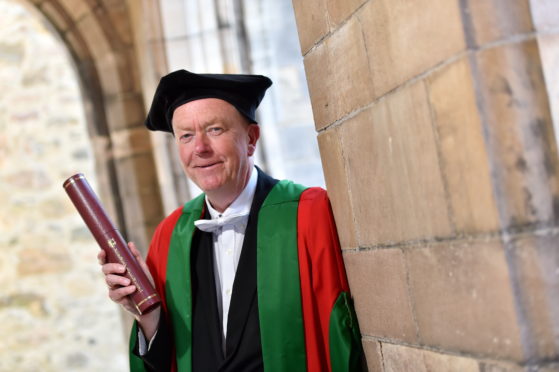Hundreds of friends and family members beamed with pride as they watched their loved ones graduate at the marquee on Aberdeen University’s grand sports lawn yesterday.
During the morning and afternoon ceremonies, doctors, scientists and sports and exercise graduates assembled under the spacious canopy to share in the celebration of their achievements while the sun streamed onto the historic campus.
Morning graduates were addressed by Professor Arash Sahraie who praised the academic staff and parents alike for helping the students throughout their studies.
He said: “These are the people who have been there for you all along – for your break-ups, as well as your break-downs; for early morning calls of encouragement, and for late night words of reassurance.
“It is also remotely conceivable that some of them may even have offered financial support at some stage of your studies.”
Dr Sahraie went on to tell an ancient Persian tale of a man and his son travelling with a donkey who are met with conflicting opinions on how to choose the transportation at their disposal.
“Like the father and son,” said Dr Sahraie. “You will never please everyone.
“But you are well equipped to work wonders in your chosen fields and change the world to be a better place for others.
“I wish you all the happiness as you go about it.”
Sir John Savill, head of experimental medicine at Edinburgh University, received an honorary degree of Doctor of Science.
Addressing the morning graduates, he spoke of how much the world of medicine had changed since he graduated from Oxford more than 40 years ago.
Welcoming the new innovations, he reminisced about the technology of his era and said: “We had to use phone boxes, write letters and with no Uber Eats, walk to the chip shop if we were hungry.
“Things have also advanced just as much in the field of clinical medicine and life expectancy has increased by 15 years, while cancer survival, more generally, has doubled over the same period.
“And childhood leukaemia, which was a death sentence for 80% of children in 1978, is now cured in over 80% of cases.
“All these advances, whether digital or medical, are the fruit of research and development. I hope many here today go on to successful careers in research.
“At school, we learn what we are taught – at university, we learn to think for ourselves. So use that gift wisely.
“I’m confident that every graduate here will find ways to make the world a better place.”
